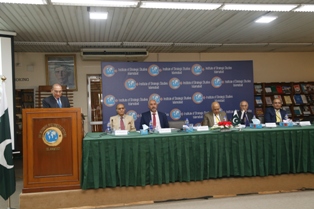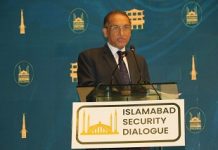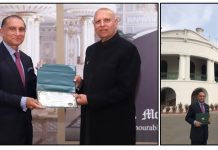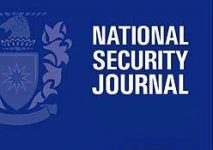Seminar on
Hindu Nationalism and the Kashmir Dispute
October 17, 2019
On August 5, the Indian governmentrevoked the occupied Jammu and Kashmir’s special status embedded in Article 370 of the Indian Constitution and bifurcated the state into two Union territories — Jammu and Kashmir with a legislature and Ladakh without one. By revoking Articles 370 and 35A of the Indian Constitution, Modi’s government stripped the Indian Occupied Kashmir of its relative independence and placed it under the direct rule of the central government in New Delhi.
The abrogation of Articles 370 and 35-A by Prime Minister Modi is the fulfillment of a long ideological yearning, under the Hindutva ideology promoted by the RSS, to make a predominantly homogeneous Hindu nation to the detriment of Muslim and other minorities of India. It is an attempt by BJP government of establishing “Akhand Bharat”.
In the lead-up to the August 5 move, India sent thousands of additional troops to the disputed region, imposed a crippling curfew, shut down telecommunications and internet, and arrested political leaders. All this has put India’s secular credentials in question.
The implications of the 5th August actions by the Indian government can be examined from various dimensions.
Legal Dimension
Under International Law as embodied in the relevant UN resolutions and the bilateral agreements, especially Simla Agreement, India cannot change the status of the disputed territory. The abrogation of Articles 370 and 35 A by the Indian government is a clear violation of UNSC resolutions on the Kashmir dispute and Simla Agreement.
Demographic changes
The abrogation of Article 35 A has opened the door for Indians from anywhere in the country to settle in Kashmir. This seems to be a deliberate move to change the demography of Indian Occupied Kashmir and undermine the Kashmiri struggle for self determination.
Economic costs
The lockdown of Kashmir has severely hampered economic activity in the area. There are different estimates reported in the media that the India’s actions in Kashmir have caused a loss of more than $1 billion over the past two months.[1] The lockdown has rendered more than 50,000 workers jobless in the carpet industry alone. As per industry experts, Srinagar’s almost 1,000 iconic houseboats have been running empty due to absence of tourists.[2]
Psychological pressure
The complete lockdown of the Kashmir valley has subjected the Kashmiris to immense psychological pressure in order to suppress their freedom struggle.
Military’s heavy hand
India has moved thousands of its troops to Indian Occupied Kashmir in addition to 700,000 troops that were already deployed in the region.
Today’s event provides an opportunity to ponder over the multi-faceted implications of Hindu nationalism on the Kashmir dispute.
The cumulative effect of Indian actions post 5th August is clearly an attempt by the present Indian regime to assert Hindu Nationalism. Kashmir seems to be the first step in the Hindutva ideology being promoted by Prime Minister Modi and BJP. The nature of what happens in Occupied Kashmir would determine the fate of the dynamics of Hindu Nationalism in India.
International community’s reaction:
While we note that the international voices of concern are rising condemning the atrocities being committed against the Kashmiris. UNSC, UNHCR, US and UK legislators, leading US papers, and several Muslim countries have all expressed concern on the lockdown in IoK. However, given the scale of whats happening in India, the international reaction is far too little. This has emboldened the Modi regime to continue with its heavy-handed-ness in IoK.
In order to present an academic perspective of the recent developments in the Indian Occupied Kashmir, we have with us Dr. Mujeeb Afzal, Professor, School of Politics and International Relations (SPIR), Quaid-e-Azam University, Islamabad.
Lt. Gen Asif Yasin Malik (Retd.), Former Secretary Defence will share his thoughts on Fasict Leaders: Future of BJP.
We also have Former Ambassador Muhammad Saeed Khalid with us who would be presenting his views on Kashmir: Dealing with Hindu Colonialism.
Finally, we would like to hear from Ambassador Faisal Niaz Tirmizi, Coordinator, Kashmir Cell, Ministry of Foreign Affairs, about government’s policy and efforts in highlighting the Kashmir issue on international forums. We are pleased to note that a Kashmir Cell has been created in the Ministry of Foreign Affairs. We are also happy that it is being headed by a professional diplomat like Ambassador Tirmizi. I have had the pleasure of seen his profound work, especially in United States.
We hope that today’s event would generate ideas that would contribute to the strategy being pursued by the Government with regard to developments in Kashmir. Earlier this month, on 9th October, we held a round table that yielded some excellent ideas on what the Government can do. I would recommend that Kashmir Cell may like to attend all Kashmir related events to be able to pick up ideas and feedback and also share the Government’s narrative and efforts.
We all are keen to listen to the learned speakers on this panel.
Thank you all for your
attention.
[1] https://www.bbc.com/news/world-asia-india-49956960
[2] Ibid.












